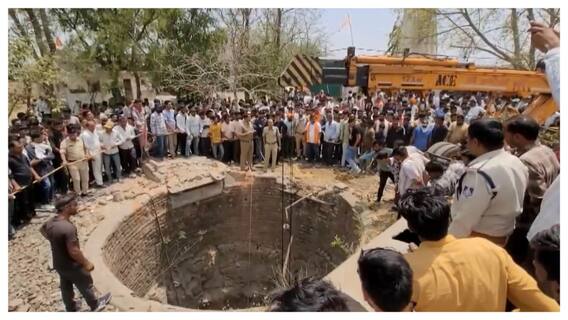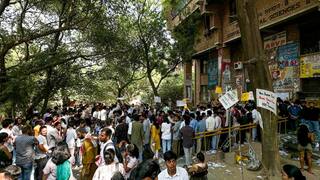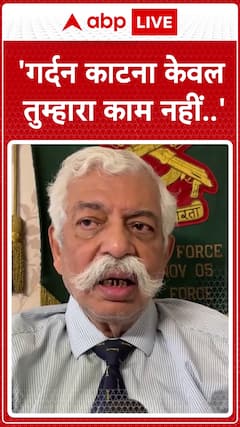Delhi NCR Pollution: Govt Defers Stricter Measures, Fines Worth Rs 25 Lakh In Haryana Over Farm Fires — Updates
Delhi AQI: The Union government has deferred the implementation of stricter measures under the air pollution control plan, stating that the air quality index (AQI) in the region is already showing a declining trend.

In a concerning development, Delhi's air quality descended to the severe plus category on Friday. The Union government has deferred the implementation of stricter measures under the air pollution control plan, stating that the air quality index (AQI) in the region is already showing a declining trend, news agency PTI reported. On Friday, the 24-hour average AQI in Delhi reached 468, placing the city in the severe plus category. At this stage, all emergency measures are mandated, including a ban on polluting trucks, commercial four-wheelers, and all types of construction activities in Delhi-NCR.
- While the air quality deteriorated to alarming levels, the Commission for Air Quality Management (CAQM) decided to monitor the situation for a day or more before implementing more stringent curbs. They cited that the restrictions under Stage III of the Graded Response Action Plan (GRAP) were imposed only a day ago, and it is reasonable to allow time for these measures to have their full impact on the AQI in the region, PTI reported.
- Delhi Lieutenant Governor VK Saxena in a series of posts on X expressed concerns over the prevailing situation as he wrote: "The situation arising out of air pollution in the City is extremely worrying. I have asked CM & Minister (Environment) for a meeting at Raj Niwas at 06:00 PM today, to take stock of the situation. I appeal to the people to remain indoors as much as possible and to not expose themselves- especially children & elderly to hazardous ambient conditions wherein AQI has reportedly crossed 800 at places."
-
Delhi Lieutenant Governor V K Saxena held a meeting to discuss interim measures, such as urging neighbouring states, especially Punjab, to control paddy stubble burning. The meeting also advised people to remain indoors, employ public transport if necessary, and optimise the use of road sweepers, water sprinklers, and anti-smog guns, as per a Raj Niwas statement cited by PTI.
"It was decided to appeal to the neighbouring states, especially Punjab, which accounted for 1,921 (71.57 per cent) incidents of parali (stubble) burning out of a total of 2,684 such events on November 1, to curtail crop residue burning by incentivising farmers so that the resultant smoke in the region could be checked," said the statement, as per PTI. Besides Punjab, 99 cases of 'parali' burning were reported in Haryana, 95 in Uttar Pradesh, and 60 in Rajasthan.The Delhi LG also emphasised the need for a long-term permanent plan of action, which will be earnestly implemented once the current air quality emergency is resolved.
- After meeting the Lieutenant Governor, Delhi Environment Minister Gopal Rai said: "We had detailed talks to ensure that the measures taken to control pollution are implemented strictly. We also discussed the officials who missed the previous meetings and requested that a direction be issued so that the senior officials join the meeting, cooperate, and work actively."
"We requested him to take action on the DPCC chairman who shut down the study on Real-time sources of pollution without discussion. There are governments of the BJP in Haryana, UP, and also at the Centre, we urged that we work in coordination with everyone. We especially requested that all officials do not boycott the (Delhi) government and work with us. All the officials have become inactive after the Centre's law (Delhi services) and its directions." - The Delhi government announced the closure of primary schools for two days to protect children from pollution.
- Hazardous pollution levels have led many residents to avoid outdoor activities, including morning walks and sports. The city has witnessed a surge in the use of masks as the capital remains shrouded in a thick haze for the fourth consecutive day. This has raised concerns for the health of children, as they breathe faster and take in more pollutants.
- Under Stage IV of GRAP, only CNG, electric, and BS VI-compliant vehicles from other states are allowed to enter Delhi. Work-from-home directives are also in place for 50% of staff in government and private offices. In response to the deteriorating air quality, the Delhi government has deployed anti-smog guns at multiple locations to reduce road dust and has re-launched the 'Red light on, Gaadi off' campaign.
- The ongoing air pollution crisis is not limited to Delhi alone, as several cities in neighboring states like Haryana, Rajasthan, and Uttar Pradesh have also reported hazardous air quality. For instance, cities like Hisar, Jind, Faridabad, and Ghaziabad recorded AQI levels well into the severe category.
- The Haryana government has issued 939 challans and imposed fines exceeding Rs 25.12 lakh, according to officials cited by PTI.
Chief Secretary Sanjeev Kaushal emphasised the state government's vigilance regarding the Air Quality Index (AQI) in Haryana. To further diminish paddy straw burning, Haryana has implemented stringent measures. He said the state has managed to achieve a notable 38% reduction in stubble-burning incidents during the current harvesting season compared to the previous year.
Some areas in Haryana have experienced air quality indices categorized as 'poor' and 'very poor' over the past few days. - The lack of rainfall during this post-monsoon season, combined with emissions from firecrackers, stubble burning, and local pollution sources, has contributed to the alarming air quality levels in Delhi-NCR during the winter months. The concentration of PM2.5, fine particulate matter that can penetrate deep into the respiratory system, has exceeded safe limits by a significant margin at multiple locations throughout the region.
- Given the deteriorating air quality and the potential health risks, the Municipal Corporation of Delhi (MCD) has allocated funds for clearing garbage along railway tracks and is using dust suppressants sprayed through anti-smog guns and water sprinklers during non-peak hours, PTI reported. Additionally, the Delhi government is urging commuters and motorists to switch off their vehicles while waiting at traffic lights through the 'Red light on, Gaadi off' campaign.
As experts continue to highlight the adverse effects of air pollution on respiratory health, measures to address the issue have become increasingly urgent. The Delhi government is working to control pollution through the phased implementation of the GRAP, enhanced enforcement, and public awareness campaigns to protect the well-being of its residents.
Trending News
Top Headlines









































